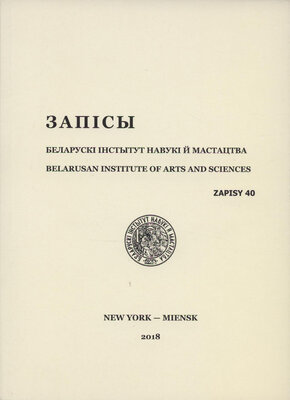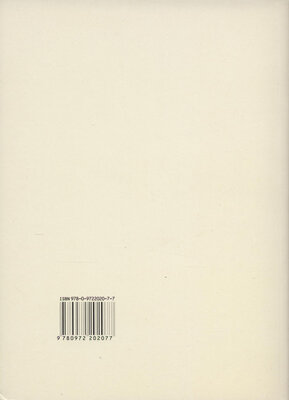Запісы 40
Памер: 811с.
Мінск, Нью Йорк 2018
Аляксандар Сьлесараў, прарэктар па навуковай працы, загадчык катэдры царкоўнай гісторыі й царкоўна-практычных дысцыплін Менскай духоўнай акадэміі, кандыдат багаслоўя, дацэнт.
Вячка Станкевіч (нар. 1932), грамадзкі дзеяч, сын Янкі й Марыі Станкевічаў. У1949 г. прыехаў у ЗША. Спачатку пасяліўся ў Мінесоце,
пазьней жыў у Кліўлэндзе, дзе ўдзельнічаў у беларускай футбольнай камандзе “Пагоня”. У 1951—1954 гг. служыў у амэрыканскім войску. Па вяртаньні жыў у Нью-Ёрку. У 1959 г. скончыў Нью-Ёрскі гарадзкі каледж з дыплёмам інжынэра-электроніка. У 1968 г. у Ньюаркскім інжынэрным каледжы (Нью-Джэрзі) атрымаў ступень магістра інжынэрыі. Гуляў за нью-ёрскую футбольную каманду “Беларусь”. Быў актыўным сябрам Згуртаваньня беларускай моладзі ў Амэрыцы, быў старшынём яго Нью-Ёрскага аддзелу, пазьней старшынём Галоўнай управы. Працаваў інжынэрам у карпарацыях ITT і Western Union. У1963—1966 гг. у сувязі з працай жыў у Заходняй Эўропе, пазьней вярнуўся ў Нью-Ёрк. Быў сябрам Беларуска-Амэрыканскага задзіночаньня, уваходзіў у кіраўніцтва арганізацыі (старшыня Галоўнай управы ў 1969—1971 гг.). У 1988—1998 гг. быў кіраўніком беларускай службы Радыё “Свабода” ў Празе. Пасьля вярнуўся ў ЗША. Стаў выдаўцом часопіса “Belarusian Review”. У 2003 г. пераняў кіраванне Фундацыяй імя Льва Сапегі. Радны БНР, быў абраны заступнікам старшыні Рады. У 2007—2011 гг. быў старшынём Галоўнай управы БАЗА. Ад 2009 г. зьяўляецца старшынём Беларускай фундацыі Крачэўскага. У 2013 г. разам з жонкай заклаў фундацыю “Monroe-Vilnia Foundation” для падтрымкі розных беларускіх праектаў.
Марыя Станкевіч (дзяв. Новак; 1900—1983), грамадзкая дзяячка, жонка Янкі й маці Вячкі Станкевічаў. У1922 г. скончыла Vassar College ў Нью-Ёрку, потым Карлаў унівэрсытэт у Празе. У1926 г. разам з мужам пераехала ў Вільню. У 1941—1945 гг. разам з сынамі жыла ў Празе, пазьней у лягерах Ды-Пі ў Нямеччыне. Брала ўдзел у працы розных беларускіх арганізацый, выкладала ў Беларускай гімназіі імя Я. Купалы. У1949 г. пераехала ў ЗША. Была сябрам Беларуска-Амэрыканскага задзіночаньня, некаторы час была кіраўніцай жаночай сэкцыі Нью-Ёрскага аддзелу арганізацыі.
Ганна Тамашэвіч-Каржанеўская (сцэнічны псэўданім Каржанеўская, нар. 1949), канцэртмайстар, акампаніятар, мастацкі кіраўнік, прафэсар Беларускай акадэміі музыкі. Скончыла Беларускую дзяржаўную кансэрваторыю па клясе фартэпіяна (1973), асыстэнтурустажыроўку па спэцыяльнасьці “акампаніятар-канцэртмайстар” (1975). У 1986—2008 гг. канцэртмайстар Акадэмічнага хору Нацыянальнай дзяржаўнай тэлерадыёкампаніі Рэспублікі Беларусь. Сярод найбольш значных працаў араторыі й кантаты А. Багатырова, Ф. Шубэрта, Л. ван Бэтховэна, С. Манюшкі, Д. Бартнянскага ды інш. Падрыхтавала да запісу опэруЯ. Голанда “Агатка, або Прыезд пана”, опэру А. Г. Радзівіла “Фаўст” і інш. Удзельнічала ў сусьветна вядомых музычных фэстывалях: імя К. Шыманоўскага, імя С. Манюшкі (Полыпча), “Нямецка-беларускія музычныя сустрэчы” (Германія), Фэстывалі ду-
хоўнай музыкі (ЗША). Гастралявала па розных краінах сьвету разам з выдатнымі айчыннымі сьпевакамі. Выйшлі іо кампакт-дыскаў зь яе ўдзелам. Займаецца дасьледаваньнямі ў галіне беларускай музыкі. 3 1996 г. зьяўляецца рэдактарам шэрагу нотных выданьняў: “Музыка старажытных сядзібаў”, “Беларускі гістарычны нотазбор”, Збор твораў Міколы Равенскага, “Беларуская вакальная музыка XVII — XXI стагодзьдзяў”.
Ціхан Чарнякевіч (нар. 1986), літаратуразнаўца, сябра Саюзу беларускіх пісьменьнікаў. Навучаўся на факультэце беларускай філялёгіі й культуры Беларускага дзяржаўнага пэдагагічнага ўнівэрсытэту імя Максіма Танка, у магістратуры й асьпірантуры пры ім. Укладальнік і камэнтатар крытычна-архіўнага зборніка “Максім Багдановіч: вядомы і невядомы” (2011), выбраных твораў Лявона Савёнка “Творы” (2012, разам з Л. Юрэвічам) і інш.
Ірына Чыкалава (нар. 1961), доктар гістарычных навук, прафэсар катэдры ўсеагульнай гісторыі й мэтодыкі выкладаньня гісторыі Беларускага дзяржаўнага пэдагагічнага ўнівэрсытэту імя Максіма Танка й Інстытуту гісторыі НАН Беларусі.
Лявон Юрэвіч (нар. 1965), архівіст, працуе ў Нью-Ёрскай публічнай бібліятэцы. Сябра БІНіМу й рэдкалегіі “Запісаў”.
SUMMARY
Adam VARLYHA. What I have heard, seen, and gone through
Not printed earlier memoirs of Jazep Hladki (1890—1972), born in the Lahojsk District, a participant of the First All-Belarusan Congress in 1917, a teacher and a public figure, who lived in the USA since the 1950s.
Topic: American History
Archivalia
Anent the history of Belarusan interbella emigration in the USA
Reprint of articles from Belarusan periodicals of the 1920s dedicated to Belarusans’ presence in Chicago and the state of Michigan.
Alexander GORNY. “We are moving forward...”: American Belarusans’ correspondence with the Council of the Belarusan People’s Republic in 1923
Publication of Janka Carapuk-Zmahar’s and Jazep Varonka’s letters to Alexander Cvikievic and members of the BPR Council sent from Chicago and dedicated to the first steps in the organization of Belarusan life in this city.
Parochial lists of St. George Belarusan Orthodox Church in Chicago (from Mikola Latuskin’s archive)
Lists of parishioners, priests, participants, and management of St. George Belarusan Parish in Chicago made by its longstanding secretary Mikola Latuskin.
Alexander ASIPOVIC-ASIPCYK. Letters
Alexander Asipcyk’s letters to Janka Zaprudnik concerning Belarusan communities in Jackson (New Jersey) and Rockford (Illinois).
Natalia HARDZIYENKA, Lavon JUREVlC. Fighting for Kupala
Article about the discussion concerning Janka Kupala’s creativity, which took place in intellectual circles of post-war emigration in connection with the publishing of the “Heritage” collection of poetry by Kupala; publication of the article “To Falsify Kupala” by M. Ravic (Janka Limanouski) in connection with the mentioned discussion.
Memoirs
George NAUMCYK. My memories of life in Belarus, Germany, and America
Memoirs of the public figure and publisher George Naumcyk, born in the Sluck District (in 1935), of his childhood in Belarus, life during World War II, life in DP camps, moving to South River (New Jersey), his public and professional work.
Viera PRUSKAJA. Memoirs
Memoirs of the wife of Mikola Pruski (1928—2014), a public figure and a publisher, Jakub Kolas’ nephew.
Vitaut KIPEL. The Association of Belarusan Scouts Abroad and new initiatives of young Belarusan emigrants
Memoirs of scouts’ life in Germany and the USA—concerning the publication in the previous issue of “Zapisy” of Ales Vinicki’s work dedicated to Belarusan Scouting.
Vitaut KIPEL. Contacts with Vasil Вукай
Memoirs of Director of the Belarusan Institute of Arts and Sciences of his acquaintance and meetings with the writer Vasil Bykaii.
Epistolary intercourse
Uladzimier Bakunovic’s Odyssey
Public figure Uladzimier Bakunovic’s letters to his friend Janka Zaprudnik concerning various events in Belarusan students’ life in Leuven, family and public events in New Jersey, Michigan, etc.
People of Books
Caslau BUDZKA. Anent the history of our national self-awareness. Letters
Reprint of the public figure and historian Caslau Budzka’s little-known work and his selected letters to Janka Zaprudnik, Jurka Vicbic, Vincent Zuk-Hryskievic, and Guy Picarda.
Leanid HALAK. Origin of “Lithuanian” grand dukes
Publication of the emigrated researcher’s work, in which he proves Scandinavian origin of grand dukes of the Grand Duchy of Lithuania.
Siarhiej JEMIALJANAU. Errors as lessons: thoughts concerning two texts on Belarusan history
The professional historian’s comments on the research publications of Caslau Budzka and Leanid Halak.
Zora KIPEL. Belarusan Tristan
Belarusan translation of the preface to the English-language publication of “Belarusan Tristan” (New York — London, 1988).
Vaclaii PANUCEVlC. About the Svislac Gymnasium and letters
Reprint of an article dedicated to the history of the Svislac Gymnasium and its famous pupils, as well as publication of his letters-appeals to various people concerning publishing and other matters.
Archive
Natalia HARDZIYENKA. Janka Carapuk-Zmahar’s and Jazep Varonka’s documents from the collection of the Belarusan Institute of Arts and Sciences at the Belarusan State Archive-Museum of Literature and Art
Publication of a report presented during the Archival Reading in October 2018, which is dedicated to Janka Carapuk-Zmahar’s and Jazep Varonka’s documents that are today preserved at the Belarusan State Archive-Museum of Literature and Art.
Establishments
Lavon JUREVlC. Kryvian (Belarusan) Scientific Association named after Francysk Skaryna and “Vieda” magazine
Reconstruction on the basis of reports of the history of the creation of a scientific organization of Belarusan post-war emigration — the Krivian (Belarusan) Scientific Association named after Francysk Skaryna, initiated by Janka Stankievic.
Vital ZAJKA. The history of BAZA: preconditions and development of the plot 2007—2011
Sketches-memoirs of the events in the Belarusan-American Association BAZA in 2007—2011.
About BAZA and not only (Natalia Hardziyenka’s conversation with Hanna Surmac)
Interview with the head of the Belarusan-American Association BAZA, public figure, journalist, and archivist Hanna Surmac.
Interviews
Belarusan cuisine in emigration (Natalia Hardziyenka’s conversation with Liza Litarovic and Nadzieja Zaprudnik)
Conversation with two American Belarusans Liza Litarovic and Nadzieja Zaprudnik about features of national cuisine in emigration.
Publications
Iryna CYKALAVA. Isaak Aronavic Hurvic (1860—1924): scientist, americanologist, publicist, public figure from Belarus in the USA
The article is dedicated to the contribution of Isaak Aronavic Hurvic (Isaac Aronovich Hourwich), who was born in Vilnia [today’s Vilnius], who graduated from the Minsk Gymnasium For Boys, the Yaroslavl Demidoff Juridical Lyceum, and Columbia University postgraduate studies, in the development of American Studies. Russian-speaking pre-revolutionary readers knew Hurvic who lived the USA thanks to publications of his articles on American life in magazines “Novoye Slovo”, “Obrazovaniye”, “Zhizn”, “Pravda”, “Sovremennyi Mir”, etc. At the same time, his largest work “Immigration and Labor: The Economic Aspects of European Immigration to the United States” (1912) has not been translated.
 КНІГІ ОНЛАЙН
КНІГІ ОНЛАЙН


